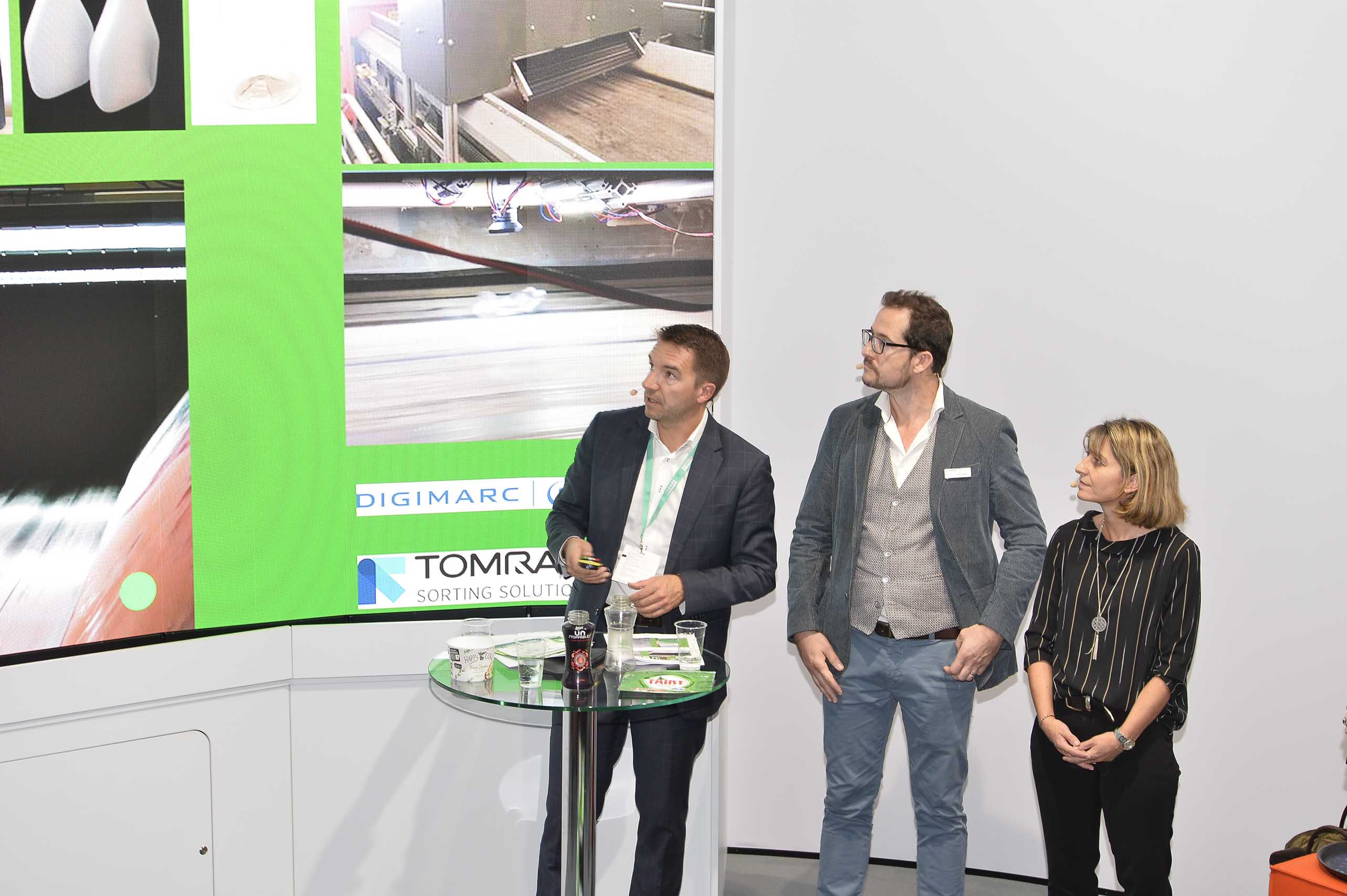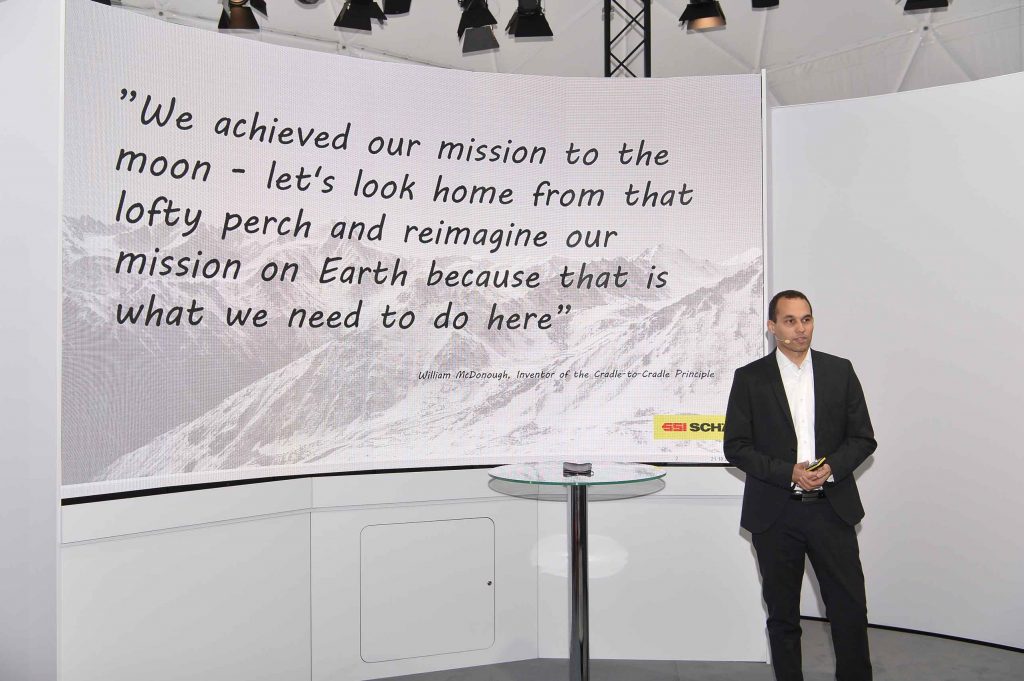
• “Holy Grail 2.0“ improves waste sorting
• “Alliance to End Plastic Waste” focuses on Asia
• Labelling of products with recyclates necessary
Düsseldorf, 21 October 2019 – On the way to higher recyclate use in new plastic products, waste management is becoming increasingly important. Because a sufficient amount of available plastic waste is the prerequisite for more recyclate. As a general rule, the purer the type of plastic waste, the higher the recyclate qualities that can be produced. And high-grade recyclate is decisive for the goal of enriching more and more products with recyclate. To improve sorting capability, the consumer goods manufacturer Procter & Gamble (P&G), together with numerous partner companies, has implemented the “Holy Grail 2.0” project. “We saw years ago that there was a need to do something about low recycling rates”, said P&G recycling specialist Gian De Belder on Monday in the VDMA pavilion. On the sixth day of K, the focus was on waste management.
With “Holy Grail 2.0”, P&G, other consumer goods manufacturers, retailers and recyclers have developed a digital watermark for plastic packaging. This is a hardly visible code that is applied to plastic packaging several times. The consumer does not see it, but a special scanner in a sorting system easily recognizes it. The code provides information about of which material the packaging is made and what has packed inside it. The stored information can be used along the entire value chain, namely from production to recovering. The complete life cycle of a piece of packaging is made transparent.
“In addition to the infrastructure and the involvement of households, low recycling rates are above all due to poor sorting efficiency. We want to change this with the digital watermark for plastics,” said De Belder.
Together against plastic pollution of the environment
There is now widespread agreement in the plastics value chain that great success in establishment of closed loop cycles are only possible in cooperation. One link in the chain alone can achieve comparatively little. This insight also underlies the “Alliance to End Plastic Waste”. 42 companies from all over the world are currently involved. “Our goal is to solve the problem of plastic waste in the environment,” said Dr. Christine Bunte, Senior Manager Industry Advocacy & Environmental Policy at BASF in an interview in the VDMA pavilion. The alliance identifies concrete projects in each of the four areas of infrastructure, education, technical innovation and collection systems.
Member companies will provide a total of 1.5 billion dollars for this purpose over the next five years, the. One project example: the establishment of a collection system at the Ganges river in India. The Ganges is one of the most polluted rivers in the world and is responsible for a large part of the garbage carpets on the oceans. “We are working with a start-up company there that is introducing a waste collection system along the river and wants to set up a plant in which the plastic can be converted into diesel fuel,” said Bunte. It is important to work together with the local people and let them share in the profits. Twelve projects have been approved, the vast majority of which concern Asian countries. “It makes sense to implement the projects where the need is greatest,” said Bunte, explaining this focus.

Everyone can do something
It doesn’t always have to be global alliances. Individual companies can also become involved in the circular economy. SSI Schäfer, a producer of storage and logistics systems, as well as waste technology, has already been using recyclate in its products for quite a long time. For example, refuse bins are turned into refuse bins again. SSI Schäfer uses recyclate from both materials and chemical recycling. Kasim Mohamad, Product and Innovation Manager, prefers however recyclate that has been depolymerized. “Quality reduces in materials recycling after some time. With chemical recycling, quality corresponding to that of virgin material is certainly obtained by introducing additives”, he said.
Many other companies will have to follow the example of SSI Schäfer if the requirements of the new packaging law, which has been in force since January, are to be met. “Here, we have to bring a further 250,000 to almost 300,000 tonnes more recycled plastics into material applications,” said Michael Wiener, Managing Director of the Dual System Germany (DSD). This major task would be easier to accomplish if the consumer could help and consciously buy a product in which recycled materials were processed. “How is the consumer supposed to fuel demand? He doesn’t even know where recyclate is contained in a product”, Wiener said, advocating uniform labelling of such products. “The consumer is more sensitive than ever about these issues. But he also expects orientation. This must be given to him via the packaging,” Wiener demanded.
Daily programme, video clips and more: https://plastics.vdma.org
—————–
In our world, plastics are indispensable. The downside is the littering. Carelessly discarded plastics products condense to form thick carpets, not just on rivers and seas, but also on land. A complete circular economy could prevent this evil and put the focus back on the benefits of plastics. In order for this to be a success, we all need to work together: processors, raw material manufacturers, mechanical engineers and recyclers, but also brand owners, end consumers and politicians.
VDMA will shine the spotlight on circular economy at the leading K 2019 trade fair in Düsseldorf in October and show how closed loops can work effectively. Throughout the process, stakeholders will be having their say in the association’s daily programme during this international industry event.

About VDMA Plastics and Rubber Machinery
More than 230 companies are members of the association, covering more than 90 percent of the industry’s production activities in Germany. Ten percent of our member companies come from Austria, Switzerland and France. The German member companies represent sales of EUR 7 billion in core machinery and EUR 10 billion including peripheral technology. Every fourth plastics machine produced in the world comes from Germany; the export rate is 70 percent. Ulrich Reifenhäuser, Member of the Management Board of the Reifenhäuser Group, is the chairman of the association.